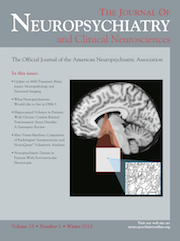To the Editor: Vitamin-B
12 deficiency (VB12D) has been associated with neuropsychiatric abnormalities like posterolateral myelopathy, peripheral neuropathy, autonomic neuropathy, optic atrophy, mood disorders, psychosis, delirium, and dementia (especially in elderly persons).
1 However, a strong causal relationship between VB12D and dementia has not been established.
A 27-year-old gentleman presented with 6 months of progressive behavior changes characterized by wandering tendencies, persecutory delusions, apathy, mutism, irritability, crying spells, disturbed sleep, and a decline in bio-socio-occupational functioning. He was diagnosed with psychosis and started on risperidone 4 mg/ day on an outpatient basis, but was brought back with symptom worsening in a month. He developed aggression, urinary incontinence, gait ataxia, and memory disturbances and was admitted. He was disoriented to time, place, and person, and had ataxic gait with a positive Romberg’s test. Vibration and proprioception sense were normal. Ophthalmoscopy revealed bilateral blurred optic disc margins. His Mini-Mental State Exam (MMSE) score was 8. A clinical diagnosis of dementia with delirium was made. Investigations revealed a hemoglobin of 11.4 gm/dl (MCV-107.4 fl); peripheral blood smear showed hypersegmented neutrophils. White blood cell count, platelets, electrolytes, and hepatic, renal, and thyroid function tests were normal. CT scan of the brain revealed diffuse cerebral atrophy with exvacuo-dilation of ventricles. Serum vitamin-B12 levels were 56.4 pg/ml (normal levels: 243–894 pg/ml). Gastric and intestinal mucosal study was normal. Dietary evaluation disclosed a very low intake of meat and other animal products.
Risperidone was stopped, and hydroxycobalamin 1 mg intramuscularly (daily for a week, weekly for 3 months, then followed by monthly until date) was started. Also, quetiapine 50 mg/day was added for the first 2 weeks to reduce aggression. His MMSE scores started increasing in 1 week and reached normal levels by the end of the 2nd week (
Table 1). His memory disturbances, behavioral symptoms, and urinary incontinence completely resolved within 1 month, and he was discharged. Ataxia improved in 2–3 months. He has maintained improvement for 8 months now.
We presented the case of a young man with VB12D-associated delirium and dementia, who rapidly improved with vitamin-B12 replacement and maintained gains for 8 months. Although he was misdiagnosed with psychosis initially, emergence of neurological symptoms led to clinical suspicion of VB12D.
Only a few reports have documented a causal link between VB12D and dementia. There are two reports of elderly men with clinical profiles indistinguishable from those of fronto-temporal dementia (FTD), who had severe VB12D, and improved completely in 6 months with replacement.
2,3 Our patient also had FTD-like behavioral symptoms; however, his atypical age made the diagnosis difficult initially. There is one report of delirium with acute dementia due to VB12D.
4Vitamin B
12 is an essential component for neuronal functioning. VB12D causes perivascular degeneration and myelin degeneration. VB12D also results defects in the methylation processes resulting in neuropsychiatric symptoms.
2In conclusion, VB12D can cause FTD-like dementia even in young individuals; the syndrome may be reversible, and treatment should be promptly initiated. Vitamin B12 level assessment should be recommended as routine screening regardless of age in neuropsychiatric patients.

